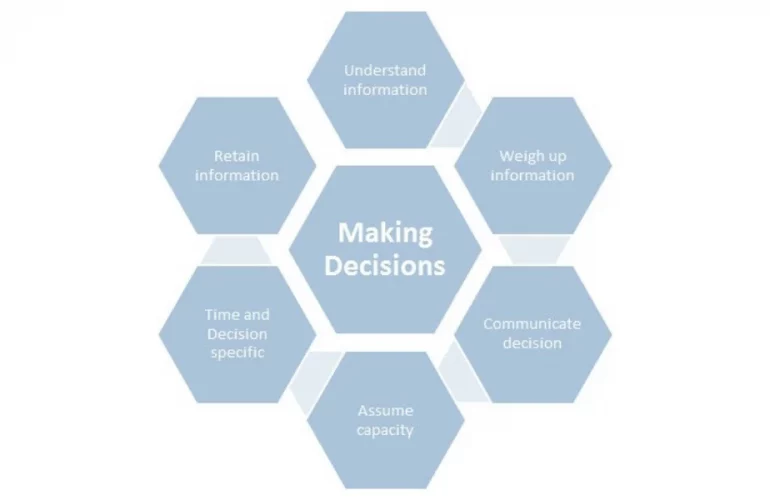What is mental capacity?
The ability to understand and make a decision when it needs to be made is called ‘mental capacity’.
The Mental Capacity Act 2005 (MCA) is a law that protects and supports who can’t make some or all decisions for themselves. The act applies to people aged 16 and over in England and Wales.
The MCA covers all types of decisions, big and small. This may be from the day-to-day, such as what to wear or eat, through to more serious or complex decisions, for example, where to live, whether to have surgery or how to manage finances or property.
We might all have problems making decisions from time to time, maybe due to tiredness or indecision. But the MCA is designed to go beyond these types of situations. It is designed specifically to empower and protect an individual who is unable to make a decision because of the way their mind or brain works is affected, for example, by illness or disability, or the effects of drugs or alcohol.
Time and decision specific
The MCA applies to situations where someone is unable to make a particular decision at a particular time because of the way their mind or brain is affected. When suffering from depression, an individual may be unable to make a decision, but when recovered they can.
And, because someone lacks capacity to make major decisions, this does not mean they are unable to make minor decisions. For example, an individual with a learning disability whilst unable to make a decision about where to live, is able to make other smaller decisions, such as what to eat, wear or do each day.
Who should assess capacity?
- Anyone caring for or supporting a person who may lack capacity could be involved in assessing capacity
- The MCA is designed to empower those in health and social care to do capacity assessments themselves, rather than rely on expert testing by psychiatrists or psychologists – good professional training is key.
- However, in cases involving complex or major decisions you may need to get a professional opinion.
When should capacity be assessed?
You may need to assess capacity where a person is unable to make a particular decision at a particular time because their mind or brain is affected by illness of disability. Lack of capacity may not be a permanent condition. Assessments of capacity should be time- and decision-specific. You cannot decide that someone lacks capacity based upon age, appearance, condition or behaviour alone.
How to assess capacity
In order to decide whether an individual has the capacity to make a particular decision you must answer two questions:
Stage 1. Is there an impairment of, or disturbance in the functioning of a person’s mind or brain? If so,
Stage 2. Is the impairment or disturbance sufficient that the person lacks the capacity to make a particular decision?
The MCA says that a person is unable to make their own decision if they cannot do one or more of the following four things:
- Understand information given to them
- Retain that information long enough to be able to make the decision
- Weigh up the information available to make the decision
- Communicate their decision – this could be by talking, using sign language or even simple muscle movements such as blinking an eye or squeezing a hand.
Every effort should be made to find ways of communicating with someone before deciding that they lack capacity to make a decision based solely on their inability to communicate. Also, you will need to involve family, friends, carers or other professionals.
The assessment must be made on the balance of probabilities – is it more likely than not that the person lacks capacity? You should be able to show in your records why you have come to your conclusion that capacity is lacking for the particular decision.
Supporting Decision Making
To assist in answering the question of whether the person is able to do this, you will need to check the following:
- Does the individual have all the relevant information needed to make the decision?
- If there is a choice of options, has information been provided on the alternatives?
- Have the communication needs of the individual been taken into account? The information needs to be presented in a way that is easier for them to understand.
- Have different communication methods been explored, including obtaining professional or carer support?
- Consider the risks and benefits, including describing the consequences of making a decision, and making no decision.
Helping people with decision making
Always return to first principles: assume that the person has capacity to make the decision in question (principle 1). In so doing, you should make every effort to encourage and support the person to make the decision for themselves (principle 2). Those supporting must take all practical and appropriate steps to enable the individual to make that decision themselves.
Best interests principle
If a person has been assessed as lacking capacity then any action taken, or any decision made for, or on behalf of that person, must be made in his or her best interests (principle 4). The person who has to make the decision is known as the ‘decision-maker’ and normally will be the carer responsible for the day-to-day care, or a professional such as a doctor, nurse or social worker where decisions about treatment, care arrangements or accommodation need to be made.
Please also see the article on the MCA 5 Core principles:
Principle 2: Individuals being supported to make their own decisions
Principle 3: Unwise decisions
Principle 4: Best interests
Principle 5: Less restrictive option
If you would like some help or advice please contact us
Thank you for reading this weeks blog, Assessing Mental Capacity .
If you would like some help please Get In Touch.
Care Navigators
(June 2022)






